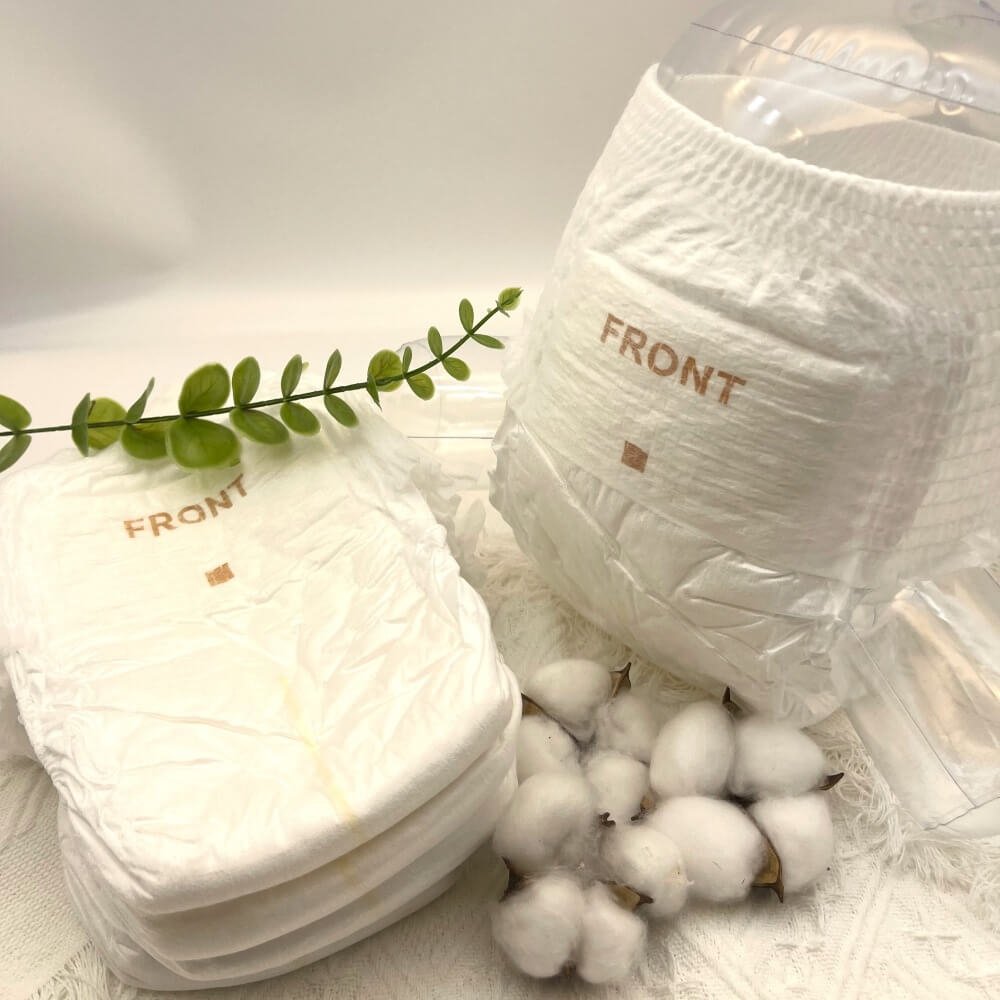Τα τελευταία χρόνια, η ζήτηση για φιλικά προς το περιβάλλον προϊόντα έχει γίνει πιο έντονη από ποτέ. Από τις βιοδιασπώμενες συσκευασίες μέχρι τα βιώσιμα ρούχα, οι καταναλωτές αναζητούν εναλλακτικές λύσεις που υποστηρίζουν έναν πιο πράσινο και υγιή πλανήτη. Μια τέτοια καινοτομία που κερδίζει ολοένα και μεγαλύτερη δημοτικότητα είναι οι πάνες από μπαμπού. Σε αντίθεση με τις παραδοσιακές πάνες, οι οποίες συχνά κατασκευάζονται από μη βιοδιασπώμενα πλαστικά και υλικά με χημικές ουσίες, οι πάνες μπαμπού είναι κατασκευασμένες από βιώσιμες ίνες μπαμπού, προσφέροντας μια φιλική προς το περιβάλλον και ασφαλή για τα μωρά λύση για τους γονείς σε όλο τον κόσμο.
Οι πάνες από μπαμπού αντιπροσωπεύουν κάτι περισσότερο από μια απλή αλλαγή στα υλικά- σηματοδοτούν μια δέσμευση για τη μείωση των αποβλήτων και την προώθηση της περιβαλλοντικής ευθύνης από την αρχή της ζωής ενός παιδιού. Αλλά τι ακριβώς κάνει τις πάνες μπαμπού τόσο ξεχωριστές; Και γιατί οι γονείς θα πρέπει να τις εξετάσουν σε σχέση με τις συμβατικές πάνες; Αυτό το άρθρο εμβαθύνει σε αυτά τα ερωτήματα, εξετάζοντας τα οφέλη, τις πτυχές ασφάλειας και τις μοναδικές ιδιότητες των πάνες μπαμπού. Σε έναν κόσμο όπου η κλιματική αλλαγή και η διατήρηση των πόρων αποτελούν πιεστικά ζητήματα, οι πάνες μπαμπού προσφέρουν ένα πολλά υποσχόμενο βήμα προς ένα βιώσιμο μέλλον τόσο για τα μωρά όσο και για το περιβάλλον.
Τι είναι οι πάνες μπαμπού;
Οι πάνες μπαμπού είναι ένας τύπος πάνας μίας χρήσης ή επαναχρησιμοποιήσιμης πάνας που κατασκευάζεται κυρίως από ίνες μπαμπού. Γνωστές για την απαλότητα, την αναπνευσιμότητα και τις υποαλλεργικές ιδιότητές τους, οι ίνες μπαμπού προέρχονται από το φυτό μπαμπού που αναπτύσσεται γρήγορα, το οποίο απαιτεί ελάχιστο νερό και καθόλου φυτοφάρμακα για να αναπτυχθεί. Τα εσωτερικά στρώματα αυτών των πάνες είναι συχνά κατασκευασμένα από βισκόζη με βάση το μπαμπού ή από ύφασμα μπαμπού, το οποίο είναι απίστευτα απαλό για το ευαίσθητο δέρμα του μωρού.
Μία από τις εξαιρετικές ιδιότητες των πάνες μπαμπού είναι η βιοδιασπασιμότητά τους. Σε αντίθεση με τις συμβατικές πάνες, οι οποίες μπορεί να χρειαστούν εκατοντάδες χρόνια για να αποσυντεθούν, οι πάνες από μπαμπού αποσυντίθενται πολύ πιο γρήγορα, καθιστώντας τες μια φιλική προς το περιβάλλον εναλλακτική λύση. Επιπλέον, το μπαμπού έχει φυσικές αντιβακτηριακές ιδιότητες, οι οποίες μπορούν να βοηθήσουν να κρατήσουν τις οσμές μακριά και να μειώσουν τον κίνδυνο εξανθήματος από την πάνα, μια κοινή ανησυχία μεταξύ των γονέων.
Η διαδικασία παραγωγής των ινών μπαμπού είναι επίσης πιο βιώσιμη. Το φυτό μπαμπού αναπτύσσεται γρήγορα μετά τη συγκομιδή, καθιστώντας το ανανεώσιμο πόρο που μπορεί να καλλιεργηθεί με βιώσιμο τρόπο. Αυτή η επιλογή με οικολογική συνείδηση δεν ωφελεί μόνο τους γονείς, αλλά συμβάλλει θετικά στη διατήρηση του περιβάλλοντος.
Γιατί οι πάνες μπαμπού είναι φιλικές προς το περιβάλλον
Οι πάνες από μπαμπού έχουν αναδειχθεί εν μέρει λόγω της φιλικής προς το περιβάλλον φύσης τους. Το ίδιο το φυτό μπαμπού είναι μια εξαιρετικά βιώσιμη καλλιέργεια, που αναπτύσσεται χωρίς την ανάγκη φυτοφαρμάκων ή λιπασμάτων και χρησιμοποιεί πολύ λιγότερο νερό από το βαμβάκι. Ο γρήγορος κύκλος ανάπτυξης του μπαμπού σημαίνει επίσης ότι μπορεί να συγκομιστεί γρήγορα και σε μεγάλες ποσότητες χωρίς να επιβαρύνει το περιβάλλον.
Επιπλέον, οι πάνες από μπαμπού είναι γενικά απαλλαγμένες από επιβλαβείς χημικές ουσίες όπως το χλώριο και οι φθαλικές ενώσεις, οι οποίες βρίσκονται συνήθως στις συμβατικές πάνες. Αυτές οι βλαβερές ουσίες δεν επηρεάζουν μόνο το δέρμα του μωρού αλλά συμβάλλουν και στη ρύπανση του περιβάλλοντος όταν απορρίπτονται. Οι πάνες από μπαμπού έχουν σχεδιαστεί για να αποσυντίθενται πιο εύκολα, πράγμα που σημαίνει ότι αφήνουν σημαντικά μικρότερο οικολογικό αποτύπωμα σε σύγκριση με τις παραδοσιακές πάνες με βάση το πλαστικό.
Ένα άλλο βασικό φιλικό προς το περιβάλλον χαρακτηριστικό των πάνες μπαμπού είναι το μειωμένο αποτύπωμα άνθρακα. Δεδομένου ότι το μπαμπού αναπτύσσεται τόσο γρήγορα και με μικρή παρέμβαση, έχει μικρότερο περιβαλλοντικό αντίκτυπο από πολλά άλλα υλικά. Η επιλογή πάνες από μπαμπού είναι ένας εφικτός τρόπος για τους γονείς να συμβάλουν σε έναν πιο πράσινο πλανήτη, εξασφαλίζοντας παράλληλα την άνεση και την ασφάλεια του μωρού τους.
Πάνες μπαμπού έναντι παραδοσιακών πάνες
Όταν εξετάζουν την καλύτερη επιλογή πάνας για το παιδί τους, οι γονείς συχνά ζυγίζουν τα πλεονεκτήματα και τα μειονεκτήματα των πάνες μπαμπού έναντι των παραδοσιακών πάνες μίας χρήσης. Οι παραδοσιακές πάνες, οι οποίες κατασκευάζονται από συνθετικά υλικά και υφίστανται επεξεργασία με διάφορες χημικές ουσίες, είναι γνωστό ότι έχουν μεγάλη διάρκεια ζωής, αλλά έχουν σοβαρά περιβαλλοντικά μειονεκτήματα. Οι περισσότερες από αυτές περιέχουν πλαστικά που μπορεί να χρειαστούν εκατοντάδες χρόνια για να διασπαστούν, συμβάλλοντας σημαντικά στα απορρίμματα των χωματερών.
Αντίθετα, οι πάνες μπαμπού προσφέρουν το πλεονέκτημα της βιοδιασπασιμότητας. Αποικοδομούνται με πολύ ταχύτερο ρυθμό, καθιστώντας τες πολύ καλύτερη επιλογή για γονείς με περιβαλλοντική συνείδηση. Επιπλέον, ενώ οι συμβατικές πάνες είναι ευρύτερα διαθέσιμες και μπορεί να φαίνονται πιο προσιτές εκ των προτέρων, οι πάνες μπαμπού τείνουν να είναι πιο αποδοτική επιλογή με την πάροδο του χρόνου λόγω της υψηλής απορροφητικότητας και της ανθεκτικότητάς τους, μειώνοντας τη συχνότητα των αλλαγών.
Από άποψη άνεσης, οι πάνες μπαμπού υπερέχουν επίσης. Οι ίνες μπαμπού είναι φυσικά μαλακές και απαλές για το ευαίσθητο δέρμα, σε αντίθεση με ορισμένα συνθετικά υλικά που βρίσκονται στις παραδοσιακές πάνες, τα οποία μπορεί να προκαλέσουν ερεθισμούς ή αλλεργικές αντιδράσεις. Επιπλέον, οι ιδιότητες του μπαμπού που απορροφούν την υγρασία βοηθούν να διατηρείται το δέρμα του μωρού στεγνό, μειώνοντας έτσι τον κίνδυνο εξανθήματος από την πάνα.
Οφέλη των πάνες μπαμπού για μωρά
Για τους γονείς, η εξασφάλιση της άνεσης και της ασφάλειας του μωρού τους αποτελεί πάντα ύψιστη προτεραιότητα. Οι πάνες από μπαμπού παρέχουν πολλά ξεχωριστά οφέλη που αντιμετωπίζουν αυτές τις ανησυχίες. Πρώτον, η ίνα μπαμπού είναι γνωστή για τις υποαλλεργικές της ιδιότητες, καθιστώντας την ιδανική επιλογή για μωρά με ευαίσθητο δέρμα. Οι παραδοσιακές πάνες μπορεί μερικές φορές να περιέχουν αρώματα ή άλλα πρόσθετα που μπορεί να προκαλέσουν ερεθισμό του δέρματος, ενώ οι πάνες από μπαμπού είναι συνήθως απαλλαγμένες από αυτούς τους πιθανούς ερεθιστικούς παράγοντες.
Η ανώτερη απορροφητικότητα του μπαμπού είναι ένα άλλο πλεονέκτημα. Η ίνα μπορεί να απορροφήσει έως και τρεις φορές το βάρος της σε υγρό, διατηρώντας το μωρό στεγνό και άνετο για μεγαλύτερο χρονικό διάστημα. Αυτό το χαρακτηριστικό είναι ιδιαίτερα ευεργετικό για τη χρήση κατά τη διάρκεια της νύχτας, μειώνοντας τον αριθμό των νυχτερινών αλλαγών πάνας και επιτρέποντας τόσο στο μωρό όσο και στους γονείς να έχουν έναν πιο ξεκούραστο νυχτερινό ύπνο.
Η αναπνευσιμότητα των ινών μπαμπού επιτρέπει επίσης την καλύτερη ροή του αέρα, η οποία μπορεί να αποτρέψει τη συσσώρευση θερμότητας και υγρασίας που συχνά οδηγεί σε εξάνθημα πάνας. Διατηρώντας ένα πιο δροσερό, ξηρότερο περιβάλλον, οι πάνες μπαμπού προσφέρουν πρόσθετη άνεση και προστασία, παρέχοντας στους γονείς ηρεμία.
Συχνές ερωτήσεις
- Είναι οι πάνες μπαμπού ασφαλείς για τα νεογέννητα;
Ναι, οι πάνες μπαμπού είναι γενικά ασφαλείς για τα νεογέννητα. Οι υποαλλεργικές και απαλλαγμένες από χημικές ουσίες ιδιότητές τους τις καθιστούν εξαιρετική επιλογή για το ευαίσθητο δέρμα ενός νεογέννητου. - Οι πάνες μπαμπού κοστίζουν περισσότερο από τις κανονικές πάνες;
Ενώ το αρχικό κόστος μπορεί να είναι ελαφρώς υψηλότερο, οι πάνες μπαμπού μπορεί να είναι πιο αποδοτικές με την πάροδο του χρόνου λόγω της ανθεκτικότητας και της απορροφητικότητάς τους, η οποία μπορεί να μειώσει τον αριθμό των αλλαγών που απαιτούνται. - Πόσο καιρό χρειάζονται οι πάνες μπαμπού για να αποσυντεθούν;
Οι πάνες μπαμπού συνήθως αποσυντίθενται πολύ πιο γρήγορα από τις παραδοσιακές πάνες, διασπώνται μέσα σε μήνες έως μερικά χρόνια, ανάλογα με τις περιβαλλοντικές συνθήκες. - Μπορούν οι πάνες μπαμπού να αποτρέψουν το εξάνθημα της πάνας;
Η φυσική αναπνευσιμότητα του μπαμπού και οι ικανότητες απορρόφησης της υγρασίας το καθιστούν αποτελεσματικό στο να διατηρεί το δέρμα στεγνό, γεγονός που μπορεί να συμβάλει στη μείωση του κινδύνου εξανθήματος από την πάνα. - Υπάρχουν επαναχρησιμοποιήσιμες πάνες μπαμπού;
Ναι, το ύφασμα μπαμπού χρησιμοποιείται επίσης στις πάνες πολλαπλών χρήσεων, παρέχοντας μια φιλική προς το περιβάλλον επιλογή που μπορεί να πλυθεί και να επαναχρησιμοποιηθεί πολλές φορές. - Πού μπορώ να αγοράσω πάνες μπαμπού;
Οι πάνες μπαμπού είναι διαθέσιμες στο διαδίκτυο και σε διάφορα φιλικά προς το περιβάλλον καταστήματα λιανικής πώλησης. Πολλές μάρκες προσφέρουν πλέον πάνες από μπαμπού ως μέρος των βιώσιμων σειρών προϊόντων τους.

